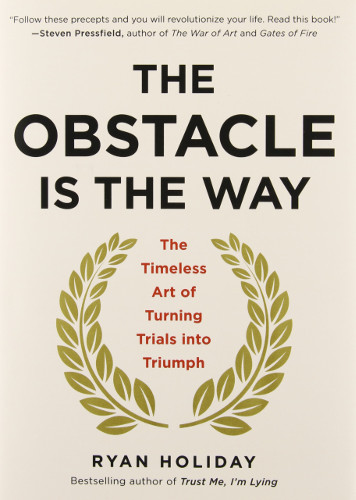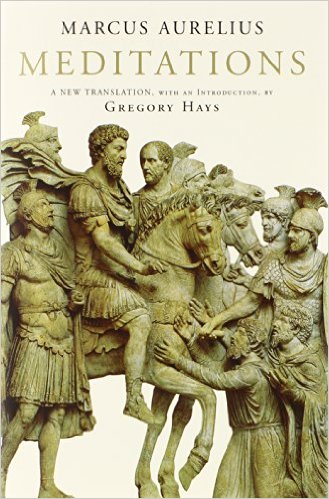This week I decided to take a look back at The Obstacle Is the Way by Ryan Holiday, which serves as a modern introduction to Stoic philosophy. Using a variety of famous figures from more recent history as well as more recent historical events, Holiday explains how we can use Stoic philosophy to deal with the obstacles that we encounter in our lives. One of the main sources of inspiration for the book is of course the famous Stoic philosopher and Roman Emperor, Marcus Aurelius and his book Meditations. On dealing with obstacles, Marcus said in Meditations:
Just as nature takes every obstacle, every impediment, and works around it–turns it to its purpose, incorporates it into itself–so, too, a rational being can turn each setback into raw material and use it to achieve its goal.
When nature encounters an obstacle it does not allow the obstacle to stop it, instead nature keeps pushing and working until it has found a way around, or through, the obstacle. This is perhaps best expressed through the metaphor of flowing water. When water encounters an obstacle, it does not stop, it eventually either finds a way around the obstacle, forces its way though it, or just drags the obstacle along with it, it does not allow the obstacle to stop it from proceeding for long. We should therefore attempt to be like the flowing water, not allowing obstacles to get in our way and simply just continue on in whatever course we can possibly follow.
In our own lives we will frequently encounter obstacles, and it is up to us to determine how we will face it, will be give up at the first sign of difficulty, or rise to the challenge and find a way past. One of the main tenants of Stoicism is being grateful, or expressing gratitude, for everything that happens to us, regardless of whether we actually wanted it to happen or not. On this point Holiday said:
It’s a little unnatural, I know, to feel gratitude for things we never wanted to happen in the first place. But we know at this point, the opportunities and benefits that lie within adversities. We know that in overcoming them, we emerge stronger, sharper, empowered. There is little reason to delay these feelings. To begrudgingly acknowledge later that it was for the best, when we could have felt that in advance because it was inevitable.
Often after something bad has happened to us, when we reflect back on it later, after having gotten past our initial reactions to it, dealt with it as best we could, and gained some perspective, we can find that ultimately there is a positive takeaway from what happened. As we were forced to find a way to deal with what happened. In the moment we are generally so occupied dealing with what is going on that we cannot take a step back and look at the event in a larger context and see how it might benefit us, only hindsight can really show us how we were able to grow and adapt because of it. If we try to keep in mind as bad things are happening, that when it is all over, we will emerge as a better and stronger person, it can help to keep us going and give us the strength to face the challenge before us.
Early in The Obstacle is the Way Holiday quotes from Marcus Aurelius in Meditations in which Marcus gives a concise explanation of how it is that we deal with, and benefit from obstacles when he says:
Our actions may be impeded by them, but there can be no impeding our intentions or our dispositions. Because we can accommodate and adapt. The mind adapts and converts to its own purposes the obstacle to our acting.
The impediment to action advances action.
What stands in the way becomes the way.
When faced with an obstacle we are forced to adapt, obviously we cannot continue in the direction that we were going and must change our approach. When we think that something has stopped us from proceeding, it really has not, if we are determined, we can continue on, it may just takes us longer to get where we were going now, as we have to find an alternate course.
Life is nothing but a continuing series of obstacles, each time we think that we have made it past and are in the clear, another one arises to block our path, or as Holiday put it towards the end of The Obstacle is the Way:
One does not overcome an obstacle to enter the land of no obstacles.
On the contrary, the more you accomplish, the more things will stand in your way. There are always more obstacles, bigger challenges. You’re always fighting uphill. Get used to it and train accordingly.
After we have faced an obstacle and have grown and adapted from the challenge, instead of getting easier, things will tend to only get harder. As we have proven ourselves facing smaller obstacles, we will be presented with greater challenges, which will only have more, and larger obstacles for us to face. This is good for us, as the obstacles help to keep us busy and our life remains interesting. As frustrating and discouraging as it can be at times as we struggle to surmount the obstacle in front of us, consider how boring life would be if we were never challenged.
There will always be obstacles in life, that we cannot control, what we can control is our reaction to the obstacles that life presents us. Do we get frustrated and complain and ask why life is being so unfair to us, or do we take on the obstacle and find a way past it, and use it as an opportunity to grow. We will never reach the end of the obstacles, as long as we continue living, all that we can do, is accept that we will encounter obstacles along the way, and attempt to prepare ourselves to handle them as they come along.


